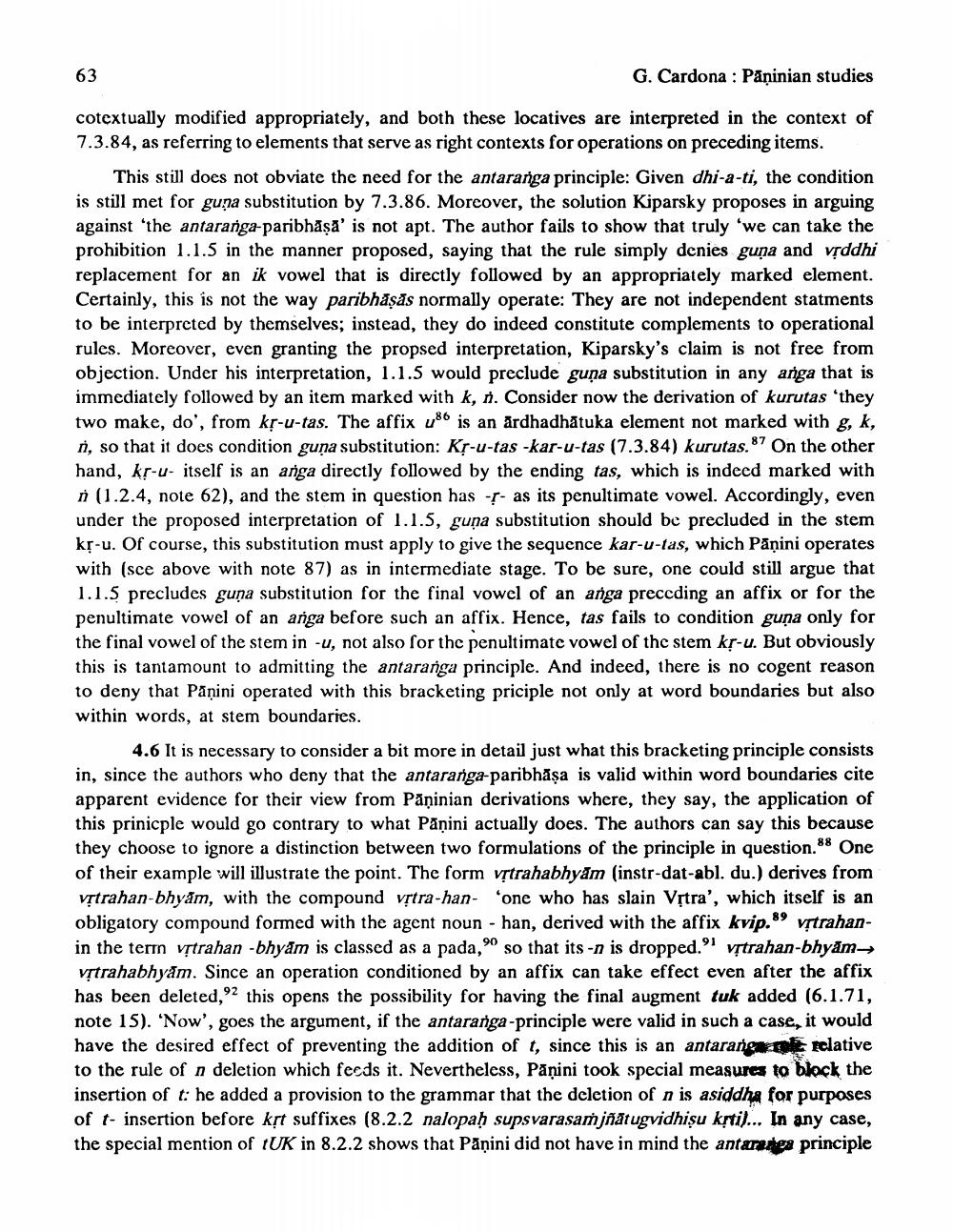________________
63
G. Cardona : Pāṇinian studies
cotextually modified appropriately, and both these locatives are interpreted in the context of 7.3.84, as referring to elements that serve as right contexts for operations on preceding items.
This still does not obviate the need for the antaranga principle: Given dhi-a-ti, the condition is still met for guna substitution by 7.3.86. Moreover, the solution Kiparsky proposes in arguing against 'the antaranga-paribhasa' is not apt. The author fails to show that truly 'we can take the prohibition 1.1.5 in the manner proposed, saying that the rule simply denies guna and vȚddhi replacement for an ik vowel that is directly followed by an appropriately marked element. Certainly, this is not the way paribhăşās normally operate: They are not independent statments to be interpreted by themselves; instead, they do indeed constitute complements to operational rules. Moreover, even granting the propsed interpretation, Kiparsky's claim is not free from objection. Under his interpretation, 1.1.5 would preclude guna substitution in any anga that is immediately followed by an item marked with k, n. Consider now the derivation of kurutas 'they two make, do', from kr-u-tas. The affix v86 is an ardhadhātuka element not marked with g, k, ri, so that it does condition guna substitution: KỊ-u-tas -kar-u-tas (7.3.84) kurutas. 87 On the other hand, kr-u- itself is an arga directly followed by the ending tas, which is indeed marked with ń (1.2.4, note 62), and the stem in question has -!- as its penultimate vowel. Accordingly, even under the proposed interpretation of 1.1.5, guņa substitution should be precluded in the stem kr-u. Of course, this substitution must apply to give the sequence kar-u-tas, which Pāṇini operates with (sce above with note 87) as in intermediate stage. To be sure, one could still argue that 1.1.5 precludes guna substitution for the final vowel of an anga preceding an affix or for the penultimate vowel of an anga before such an affix. Hence, tas fails to condition guņa only for the final vowel of the stem in -u, not also for the penultimate vowel of the stem kr-u. But obviously this is tantamount to admitting the antaranga principle. And indeed, there is no cogent reason to deny that Panini operated with this bracketing priciple not only at word boundaries but also within words, at stem boundaries.
4.6 It is necessary to consider a bit more in detail just what this bracketing principle consists in, since the authors who deny that the antaranga-paribhășa is valid within word boundaries cite apparent evidence for their view from Pāņinian derivations where, they say, the application of this prinicple would go contrary to what Pāṇini actually does. The authors can say this because they choose to ignore a distinction between two formulations of the principle in question.88 One of their example will illustrate the point. The form vstrahabhyam (instr-dat-abl. du.) derives from vītrahan-bhyåm, with the compound vstra-han- 'one who has slain Vstra', which itself is an obligatory compound formed with the agent noun - han, derived with the affix kvip.89 vộtrahanin the term vstrahan-bhyam is classed as a pada,” so that its -n is dropped. vȚtrahan-bhyam vītrahabhyam. Since an operation conditioned by an affix can take effect even after the affix has been deleted, this opens the possibility for having the final augment tuk added (6.1.71, note 15). Now', goes the argument, if the antaranga-principle were valid in such a case, it would have the desired effect of preventing the addition of t, since this is an antaranga cote relative to the rule of n deletion which feeds it. Nevertheless, Pāņini took special measures to block the insertion of t: he added a provision to the grammar that the deletion of n is asiddha for purposes of t- insertion before kst suffixes (8.2.2 nalopah supsvarasamjñātugvidhişu krti)... In any case, the special mention of UK in 8.2.2 shows that Paņini did not have in mind the antarea principle




